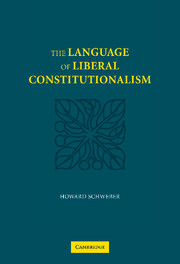Book contents
- Frontmatter
- Contents
- Introduction
- 1 The Search for Sovereignty: Law, Language, and the Beginnings of Modern Constitutionalism
- 2 Consent How? Challenges to Lockean Constitutionalism
- 3 Constitutional Language and the Possibility of Binding Commitments
- 4 Consent to What? Exclusivity and Completeness in Constitutional and Legal Language
- 5 The Question of Substance: Morality, Law, and Constitutional Legitimacy
- 6 The Defense of Constitutional Language
- Bibliography
- Index
6 - The Defense of Constitutional Language
Published online by Cambridge University Press: 17 July 2009
- Frontmatter
- Contents
- Introduction
- 1 The Search for Sovereignty: Law, Language, and the Beginnings of Modern Constitutionalism
- 2 Consent How? Challenges to Lockean Constitutionalism
- 3 Constitutional Language and the Possibility of Binding Commitments
- 4 Consent to What? Exclusivity and Completeness in Constitutional and Legal Language
- 5 The Question of Substance: Morality, Law, and Constitutional Legitimacy
- 6 The Defense of Constitutional Language
- Bibliography
- Index
Summary
This book began with two questions: First, under what conditions is the creation of a legitimate constitutional regime possible? Second, what must be true about a constitution if the regime that it grounds is to retain its claim to legitimacy? Both of these questions were specifically posed in the context of a liberal constitutional regime, meaning one committed to ideals of democratic self-rule and the presence of value pluralism. As a result, the questions were framed in terms of the necessity of finding a source of legitimacy in some version of consent, so that the two questions could be conveniently rephrased as “Consent How?” and “Consent to What?” The answers to these questions were pursued through the development of a theory of constitutional language. So for the purposes of the development of that theory, the questions were rephrased yet again, this time becoming “How is binding consent to a system of constitutional language possible?” and “What must be true about that system of constitutional language in order that consent to its creation and maintenance is sufficient to ground a liberal constitutional regime?” It is now possible to summarize those answers as they have appeared in the preceding five chapters.
In order to frame the question, Chapter 1 focused on the historical roots of liberal constitutionalism, from Jean Bodin's personal sovereign exercising near-absolute authority over subjects, through Thomas Hobbes' anthropomorphic commonwealth, and finally to John Locke's constitutionalism.
- Type
- Chapter
- Information
- The Language of Liberal Constitutionalism , pp. 319 - 348Publisher: Cambridge University PressPrint publication year: 2007

